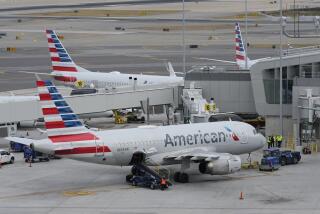Ups, Downs of Prepaid Plane Ticket
- Share via
With all the attention given to air fares, it may not have been fully noted that many domestic airlines raised their service charges for prepaid tickets at the beginning of the year. In most cases the charges went up from $15 to $20, or from $10 to $15.
The cost of processing prepaid tickets was the major reason cited for the service charge hikes.
Using prepaid tickets is generally for special situations instead of the usual methods of sending tickets by mail, etc. But when there is an emergency, and time is a factor, prepaid tickets serve a purpose. Prepaid tickets are also sometimes used because they are only refundable to the sender--the receiver can’t cash them in.
“Prepaid tickets should only be used in emergency situations,” says Martha Scott, manager of Glendale Travel. “Unless it’s a 24-hour situation, we recommend that people buy their tickets and have them sent by overnight or certified mail.”
Additional Charge
Some travel agents may tack on their own service charge for handling prepaid tickets. “If the ticket is under $100, we have a service charge unless it’s a client we’ve done work for,” Scott says.
As far as insuring that tickets sent to others aren’t cashed in, there is another method ticket buyers can use, Scott says. “You can always ask the airline or a travel agent to state on the ticket that it’s refundable at the issuing office only, but it’s the passenger’s responsibility to ask for this provision.”
One of the biggest misconceptions some travelers have about prepaid tickets is the belief that once they have bought the tickets they have met all obligations. “The prepaid ticket is strictly a transfer of money,” Scott says. “The ticket hasn’t been issued, and won’t be issued until the receiver shows up to get it.”
Moreover, the receiver has to follow the rules governing that type of ticket. With tickets such as the new “maxsaver” discounts, the tickets may have to be picked up within 24 hours of the reservation, Scott says. If they aren’t, the reservation may be gone, and the cost is not refundable to the purchaser.
With some fares, the purchaser or the receiver can make changes in the flight dates at no extra cost. Changes with some discount fares may involve a cancellation penalty, and some fares may not allow changes. “Always find out the specifics of the fare, and if it’s a discount fare, make sure that the receiver is aware of this information,” says Margarita Holmstrom, a passenger service specialist with Delta Airlines.
Make sure you get the number of your prepaid ticket reservation and pass it on to the person who will pick up the ticket, Scott says. “This way, if there’s some problem at the other end, the receiver has something to give the airline and make it start looking.”
Holmstrom said that only the person whose name is on the ticket can pick it up. “You can’t send someone else, and you have to show identification, preferably something with your picture, like a driver’s license. The traveler has to sign his or her name on the ticket.”
Suppose the prepaid ticket is for a child?
“Some airlines have different policies with children,” Scott says. “For example, carriers might ask the buyer to provide a code word for the child, or an accompanying adult, to use. Such code words might be a favorite toy or a nickname, something no one else would know.”
In general, airlines want children to have some sort of identification such as a birth certificate or a school or library card. But supervisors at airports usually have the latitude to make exceptions.
While most prepaid tickets are picked up on the day of the flight at airports, they can be obtained prior to the day of the flight at other airline locations such as city ticket offices. Tickets may have to be picked up at special counters at some airports with some airlines.
“We recommend getting to the airport 45 minutes earlier than otherwise planned,” Scott says. “Even though the ticket has been paid for, you still have to go through the mechanics of having the ticket issued, plus providing identification.”
Your Responsibilities
Travelers should also realize where the airline’s responsibility ends. “All we do is contact people that their prepaid tickets are available,” Holmstrom says.
Anyone awaiting tickets can call the airline to see if they are available. “We ask for home and business numbers and try to phone people within hours of the purchase, and we advise them of the closest pickup point if they’re not going directly to the airport,” Holmstrom says.
With Delta, prepaid tickets are kept accessible for 30 days and then go in an inactive file. The purchaser can get a refund (eventually, as it can take time to process) for an unused ticket but not for the service charge.
The procedure for prepaid tickets for international flights is essentially the same, though more time may be involved to set them up. Some foreign carriers may charge a service fee. Lufthansa, for example, levies a $15 charge. SAS, on the other hand, has no charge.
“Sending prepaid tickets overseas guarantees that the ticket is only refundable to the purchaser, that it doesn’t get lost in the mail and gets there in time,” said Stephanie Eisenberg, senior agent at the SAS city ticket office in Los Angeles.
More to Read
Sign up for The Wild
We’ll help you find the best places to hike, bike and run, as well as the perfect silent spots for meditation and yoga.
You may occasionally receive promotional content from the Los Angeles Times.






